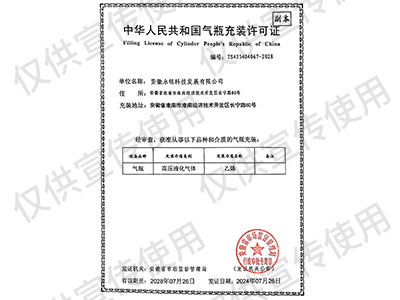Knowledge of gases
When selecting an ethylene filling plant, it is necessary to comprehensively consider various factors such as safety, compliance, technical strength, and service guarantees, as ethylene is a flammable and explosive hazardous chemical. The standardization of the filling process is directly related to the safety of subsequent transportation, storage, and use. The following are specific selection points:
1. Prioritize the verification of qualification compliance to ensure "legal operation"
1. Core qualifications must be complete
(1) Holding a "Hazardous Chemicals Business License" (specifically including the scope of ethylene filling and sales), a "Special Equipment (Pressure Vessel) Use Registration Certificate", a "Gas Cylinder Filling License", etc., are the statutory prerequisites for engaging in ethylene filling, and none of them can be omitted.
(2) Check the validity period of qualifications to avoid selecting manufacturers with expired qualifications or operating beyond their scope, as otherwise they may face legal risks and safety hazards.
2. Production and filling process is compliant
Confirm whether the manufacturer complies with national regulations such as the "Safety Technical Regulations for Gas Cylinders" and the "Regulations on the Safety Administration of Hazardous Chemicals", including regular inspection of steel cylinders, pre-filling inspection (checking whether the cylinder body is intact, whether the valve leaks, etc.), and whether the filling volume meets standards, to avoid safety accidents caused by procedural violations.
II. Pay attention to technology and equipment to ensure "filling safety"
1. The progressiveness and safety of the filling equipment
(1) Check whether an automated filling system (to reduce manual operation errors), an overpressure alarm device, an emergency shut-off device, etc. are equipped. These devices can effectively avoid risks such as overfilling and abnormal pressure.
(2) Understand the maintenance and inspection status of steel cylinders: As pressure vessels, steel cylinders must be regularly inspected and tested by statutory inspection agencies to ensure that they meet standards, and their appearance must be free of defects such as corrosion, deformation, and scratches, to ensure the safety and reliability of the containers themselves after filling.
2. Is there a professional technical team
The filling personnel must hold a Special Equipment Operator Certificate (for cylinder filling operations) and possess the ability to handle emergencies such as leaks and overpressure. The professionalism of the technical team directly affects the safety of the filling process.
III. Examine safety management and risk prevention and control capabilities
1. Full-chain security measures
(1) Storage link: Whether there is a dedicated explosion-proof warehouse and ventilation system, and whether the distance from fire sources and heat sources meets safety standards.
(2) Transportation cooperation: Whether to cooperate with logistics companies that have hazardous chemical transportation qualifications, whether the transportation vehicles are equipped with explosion-proof and fire-fighting equipment, and whether the drivers have undergone professional training.
2. Risk coverage mechanism
For example, Anhui Shunyu Xin Chemical Technology Co., Ltd. purchases insurance for steel cylinders. Such measures can reduce losses for customers and businesses in case of accidents, reflecting the company's sense of responsibility. When making choices, priority should be given to manufacturers with similar risk protection.
IV. Reference product quality and supply stability
1. Ethylene purity and quality testing
The manufacturer is required to provide a product quality inspection report to confirm whether the ethylene purity (such as 99.95% or above), impurity content, and other indicators meet the procurement requirements (such as industrial grade, medical grade, and other different standards).
2. Supply capacity and emergency response
(1) Understand whether the manufacturer's production capacity and inventory can meet long-term or bulk procurement needs, to avoid production disruptions due to insufficient supply.
(2) Inquire whether there is an emergency supply plan, such as the response speed in case of temporary additional orders, to ensure the stability of cooperation.
V. Customer Reputation and Industry Evaluation
1. Field investigation and case reference
When conditions permit, you can visit the manufacturer's filling workshop and storage facilities on-site to gain an intuitive understanding of its management level. Alternatively, you can inquire with peers or upstream and downstream enterprises to learn about the manufacturer's reputation for cooperation (such as whether there have been safety accidents, quality disputes, etc.).
2. After-sales service
Confirm whether after-sales support is provided, such as guidance on cylinder usage, return and replacement services for problematic cylinders, emergency assistance in case of accidents, etc. A comprehensive after-sales service can reduce communication costs in cooperation.
summarize
The core principle for selecting ethylene filling plants is "safety first, compliance as the foundation, and safeguards as a supplement". Prioritize excluding manufacturers with incomplete qualifications and non-standard processes, focus on evaluating technical equipment, safety management, and risk prevention and control capabilities, and then make a comprehensive judgment based on product quality, supply stability, and customer reputation. Only in this way can we minimize cooperation risks and ensure the safety and efficiency of procurement and use processes.
1. Prioritize the verification of qualification compliance to ensure "legal operation"
1. Core qualifications must be complete
(1) Holding a "Hazardous Chemicals Business License" (specifically including the scope of ethylene filling and sales), a "Special Equipment (Pressure Vessel) Use Registration Certificate", a "Gas Cylinder Filling License", etc., are the statutory prerequisites for engaging in ethylene filling, and none of them can be omitted.
(2) Check the validity period of qualifications to avoid selecting manufacturers with expired qualifications or operating beyond their scope, as otherwise they may face legal risks and safety hazards.
2. Production and filling process is compliant
Confirm whether the manufacturer complies with national regulations such as the "Safety Technical Regulations for Gas Cylinders" and the "Regulations on the Safety Administration of Hazardous Chemicals", including regular inspection of steel cylinders, pre-filling inspection (checking whether the cylinder body is intact, whether the valve leaks, etc.), and whether the filling volume meets standards, to avoid safety accidents caused by procedural violations.
II. Pay attention to technology and equipment to ensure "filling safety"
1. The progressiveness and safety of the filling equipment
(1) Check whether an automated filling system (to reduce manual operation errors), an overpressure alarm device, an emergency shut-off device, etc. are equipped. These devices can effectively avoid risks such as overfilling and abnormal pressure.
(2) Understand the maintenance and inspection status of steel cylinders: As pressure vessels, steel cylinders must be regularly inspected and tested by statutory inspection agencies to ensure that they meet standards, and their appearance must be free of defects such as corrosion, deformation, and scratches, to ensure the safety and reliability of the containers themselves after filling.
2. Is there a professional technical team
The filling personnel must hold a Special Equipment Operator Certificate (for cylinder filling operations) and possess the ability to handle emergencies such as leaks and overpressure. The professionalism of the technical team directly affects the safety of the filling process.
III. Examine safety management and risk prevention and control capabilities
1. Full-chain security measures
(1) Storage link: Whether there is a dedicated explosion-proof warehouse and ventilation system, and whether the distance from fire sources and heat sources meets safety standards.
(2) Transportation cooperation: Whether to cooperate with logistics companies that have hazardous chemical transportation qualifications, whether the transportation vehicles are equipped with explosion-proof and fire-fighting equipment, and whether the drivers have undergone professional training.
2. Risk coverage mechanism
For example, Anhui Shunyu Xin Chemical Technology Co., Ltd. purchases insurance for steel cylinders. Such measures can reduce losses for customers and businesses in case of accidents, reflecting the company's sense of responsibility. When making choices, priority should be given to manufacturers with similar risk protection.
IV. Reference product quality and supply stability
1. Ethylene purity and quality testing
The manufacturer is required to provide a product quality inspection report to confirm whether the ethylene purity (such as 99.95% or above), impurity content, and other indicators meet the procurement requirements (such as industrial grade, medical grade, and other different standards).
2. Supply capacity and emergency response
(1) Understand whether the manufacturer's production capacity and inventory can meet long-term or bulk procurement needs, to avoid production disruptions due to insufficient supply.
(2) Inquire whether there is an emergency supply plan, such as the response speed in case of temporary additional orders, to ensure the stability of cooperation.
V. Customer Reputation and Industry Evaluation
1. Field investigation and case reference
When conditions permit, you can visit the manufacturer's filling workshop and storage facilities on-site to gain an intuitive understanding of its management level. Alternatively, you can inquire with peers or upstream and downstream enterprises to learn about the manufacturer's reputation for cooperation (such as whether there have been safety accidents, quality disputes, etc.).
2. After-sales service
Confirm whether after-sales support is provided, such as guidance on cylinder usage, return and replacement services for problematic cylinders, emergency assistance in case of accidents, etc. A comprehensive after-sales service can reduce communication costs in cooperation.
summarize
The core principle for selecting ethylene filling plants is "safety first, compliance as the foundation, and safeguards as a supplement". Prioritize excluding manufacturers with incomplete qualifications and non-standard processes, focus on evaluating technical equipment, safety management, and risk prevention and control capabilities, and then make a comprehensive judgment based on product quality, supply stability, and customer reputation. Only in this way can we minimize cooperation risks and ensure the safety and efficiency of procurement and use processes.





